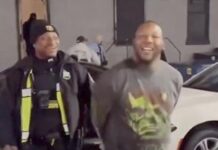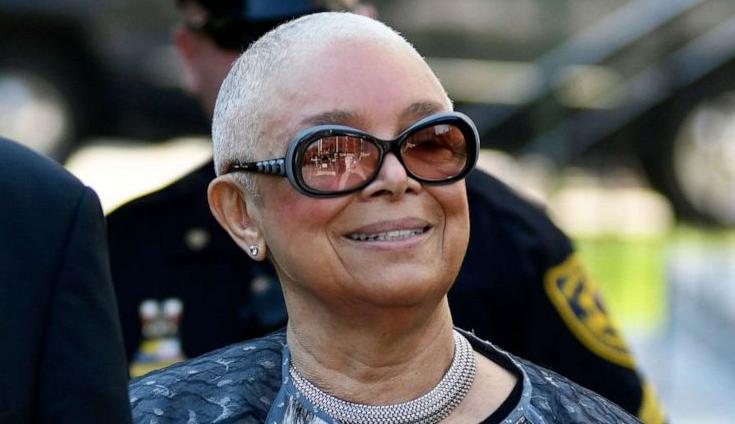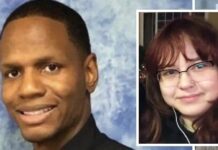 *More than 100 participants in the Poor People ’s Campaign: A National Call for Moral Revival were arrested at the U.S. Supreme Court Monday as the movement set its sights on the high court’s ongoing assault on workers’ rights and voting rights, including today’s ruling to uphold Ohio’s purge of voters from the rolls.
*More than 100 participants in the Poor People ’s Campaign: A National Call for Moral Revival were arrested at the U.S. Supreme Court Monday as the movement set its sights on the high court’s ongoing assault on workers’ rights and voting rights, including today’s ruling to uphold Ohio’s purge of voters from the rolls.
As decisions in landmark cases concerning union rights, the Muslim ban and partisan gerrymandering loom, Campaign Co-Chair the Rev. William Barber was taken into custody along with workers in the Fight for $15, SEIU Secretary-Treasurer Gerry Hudson, Communications Workers of America President Chris Shelton and Secretary-Treasurer Sara Steffens and other labor leaders as part of a wave of nonviolent direct action highlighting the crisis of inequality in America.
 After the Rev. Barber and scores of others were arrested in front of the Supreme Court, a group of clergy and people of faith, led by Campaign Co-Chair the Rev. Liz Theoharis, was arrested while paying on the Court’s steps. In addition to the Rev. Theoharis, the group included the Rev. Jimmie Hawkins of the Presbyterian Church; the Rev. William Lamar, pastor of Metropolitan African Methodist Church in Washington, D.C; the Rev. Graylan Hagler of the United Church of Christ; Rob Stephens, pastor at Middle Collegiate Church in New York City; and Hershey Mallette Stephens of the Episcopal Church, among others.
After the Rev. Barber and scores of others were arrested in front of the Supreme Court, a group of clergy and people of faith, led by Campaign Co-Chair the Rev. Liz Theoharis, was arrested while paying on the Court’s steps. In addition to the Rev. Theoharis, the group included the Rev. Jimmie Hawkins of the Presbyterian Church; the Rev. William Lamar, pastor of Metropolitan African Methodist Church in Washington, D.C; the Rev. Graylan Hagler of the United Church of Christ; Rob Stephens, pastor at Middle Collegiate Church in New York City; and Hershey Mallette Stephens of the Episcopal Church, among others.
“There is no justice in a court ruling to rob America’s poorest people of their right to organize in a union or participate in the political system,” said the Rev. Barber. “The grave inequality this country faces today was manufactured by judges and politicians who stacked power in the hands of corporations and the rich. Our movement is the counterweight America needs to restore power to the poor and disenfranchised and rebalance the scales of justice.”
Across the country, a historic season of nonviolent direct action entered its fifth straight week Monday as hundreds of fast-food workers in the Fight for $15, union members, clergy and advocates were arrested at 35 state capitols demanding lawmakers confront the nation’s soaring inequality. For the second straight week, protesters were barred from entering the statehouse in Kentucky. Carrying signs reading “Poverty Wages = Policy Violence” and “America Needs Unions,” protestors across the country called for living wages, the right for all workers to join unions, fully funded anti-poverty programs and free tuition at public colleges, among other reforms.
“I’ve worked hard in fast-food for 20 years now, and I’m still paid so little I’ve had to face eviction and homelessness because I can’t even afford rent,” said Kenya Banks, a McDonald’s worker and Fight for $15 leader from Kansas City, Missouri. “Meanwhile companies like McDonald’s pay their CEO millions of dollars every year. We need $15 an hour and the right to a union, and we’re ready to do whatever it takes until we win.”
More than 2,000 Poor People’s Campaign activists have now been arrested while participating in what has become the most expansive wave of nonviolent direct action in U.S. history.
Congress Responds to Poor People’s Campaign
U.S. Sens. Elizabeth Warren and U.S. Rep. Elijah Cummings announced they will convene a hearing on Capitol Hill Tuesday on economic inequality, union rights, voter suppression and other issues raised by the new Poor People’s Campaign. U.S. Sen. Cory Booker is expected to be among a dozen lawmakers who will hear testimony from and question campaign Co-Chairs Barber and Theoharis, along with victims of systemic poverty, systemic racism, ecological devastation and America’s war economy.
The Congressional hearing comes as a war on the poor unfolds across the country. From Arkansas to Kentucky to Michigan to Indiana to South Carolina, states are imposing work requirements on Medicaid recipients that could rob hundreds of thousands of healthcare coverage. The Trump administration is continuing efforts to undermine the Affordable Care Act, urging a federal judge in Texas to throw out the law’s protection for people with pre-exisitng conditions. U.S. Housing and Urban Development Secretary Ben Carson recently unveiled a plan that would raise rents for low-income tenants by 20 percent a year. Republicans in the U.S. voted to cut $7 billion from the Child Health Insurance Program. And Republicans in North Carolina are trying yet again to institute a voter I.D. law, after their previous attempt was struck down in court.
“Across the country there are politicians that try to win votes by saying they are people of faith, yet they prosecute a war on the poor that violates every basic moral teaching,” said Rev. Theoharis. “That’s why our movement is building power for moral leaders who will challenge the country’s political and economic structures and eradicate the systemic sin of poverty in America.”
Not only is there a war on the poor, there’s a war against poor speaking out against the policies that are pushing them deeper into poverty.
Across the country, lawmakers are cracking down on the tens of thousands of poor people who have taken to the streets in recent weeks as part the reignition of the Poor People’s Campaign. Participants were denied entry into the Kentucky statehouse, blocked from the Arkansas statehouse and arrested before even entering the New Jersey statehouse. In New York, Poor People’s Campaign participants were hit with a bill for “rally security” by the city of Albany. And in Kansas, Poor People’s Campaign participants were informed that they “harmed” the Kansas statehouse and won’t be allowed back to protest.
The Unfinished Work of 1968 Poor People’s Campaign
Over the past two years, leaders of the Poor People’s Campaign: A National Call for Moral Revival have been laying the groundwork for this week’s protests. They carried out a listening tour in dozens of states across this nation, meeting with tens of thousands of people from El Paso, Texas to Marks, Mississippi to South Charleston, West Virginia. Led by the Revs. Barber and Theoharis, the campaign has gathered testimonies from hundreds of poor people and listened to their demands for a better society.
A Poor People’s Campaign Moral Agenda, announced in April, was drawn from this listening tour, while an audit of America conducted with allied organizations, including the Institute for Policy Studies and the Urban Institute, showed that, in many ways, we are worse off than we were in 1968.
Earlier this year, poor people, clergy and advocates traveled to statehouses all over the country and the U.S. Capitol to serve notice on lawmakers of the demand that they address the enmeshed evils of systemic racism, poverty, the war economy, ecological devastation and America’s distorted national morality. Lawmakers have failed to act, and this spring’s six weeks of nonviolent moral fusion direct action is yet another attempt to instruct them on these issues.
The Campaign draws on the unfinished work of the 1968 Poor People’s Campaign, reigniting the effort led by civil rights organizations, labor union and tenant unions, farm workers, Native American elders and grassroots organizers to foster a moral revolution of values. Despite real political wins in 1968 and beyond, the original Poor People’s Campaign was tragically cut short, both by Dr. King’s assassination and by the subversion of the coalition that sustained it. Still, the original vision and many of its followers did not go away.
The Poor People’s Campaign: A National Call for Moral is building a broad and deep national moral movement – rooted in the leadership of poor people and reflecting the great moral teachings – to unite our country from the bottom up. Coalitions have formed in 39 states and Washington, D.C. to challenge extremism locally and at the federal level and to demand a moral agenda for the common good.
The Poor People’s Campaign: A National Call for Moral Revival is co-organized by Repairers of the Breach, a social justice organization founded by the Rev. Barber; the Kairos Center for Religions, Rights and Social Justice at Union Theological Seminary; and hundreds of local and national grassroots groups across the country.
source:
Michelle Morris
michelle.morris@berlinrosen.
We Publish News 24/7. Don’t Miss A Story. Click HERE to SUBSCRIBE to Our Newsletter Now!





